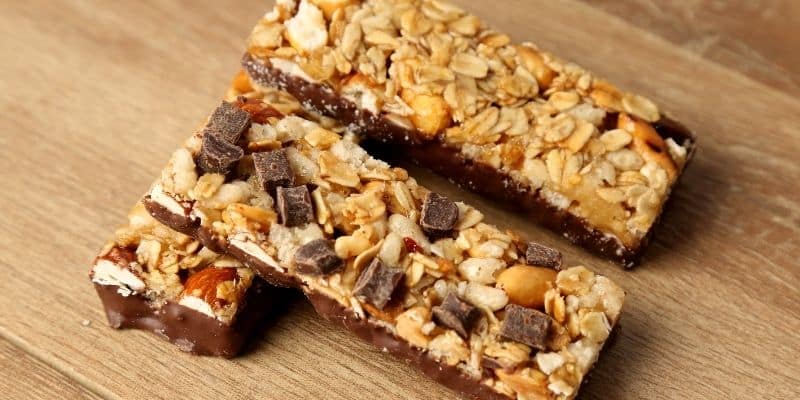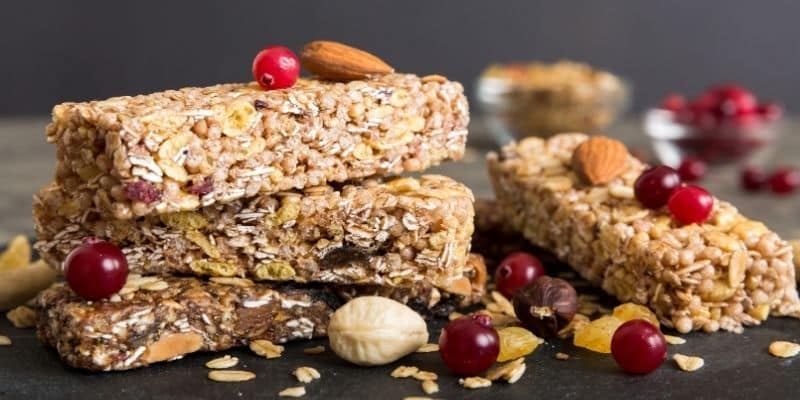The role of protein in the quest for greater physical strength and a more toned physique cannot be overstated. Protein bars for muscle gain have become increasingly popular among fitness enthusiasts looking to enhance their workouts and optimize recovery. This article explores the effectiveness of protein bars for muscle gain, compares them with other protein sources, and provides insights into how they can be integrated into a diet for optimal results.
Table of Contents
- Understanding Protein Bars for Muscle Gain
- The Science Behind Protein Bars for Muscle Gain
- Protein Requirements for Muscle Gain with Protein Bars
- Types of Protein Sources in Protein Bars for Muscle
- Are protein bars for muscle gain effective?
- Choosing the Right Protein Bar for Muscle Gain
- Benefits of Using Protein Bars For Muscle Gain
- Final Takeaway:
- FAQs

Understanding Protein Bars for Muscle Gain
Protein is essential for muscle growth and recovery. When you engage in resistance training or strenuous exercise, your muscles undergo micro-tears that require repair. Adequate protein intake is crucial to facilitating this process. According to the American College of Sports Medicine, athletes should consume between 1.2 and 2.0 grams of protein per kilogram of body weight daily to support muscle repair and growth.
The Science Behind Protein Bars for Muscle Gain
Muscle protein synthesis (MPS) is how your body repairs and builds new muscle fibers. Consuming protein bars for muscle gain after a workout can significantly enhance MPS, increasing muscle growth. Research indicates that fast-digesting proteins like whey in many protein bars can effectively stimulate this process.
Protein Requirements for Muscle Gain with Protein Bars
To effectively build muscle, you must consistently meet your daily protein requirements. For individuals engaged in intense strength training, this typically means consuming between 1.6 and 2.2 grams of protein per kilogram of body weight. However, achieving this through whole foods alone can be challenging, especially for those with busy lifestyles. Protein bars for muscle gain offer a quick and easy way to supplement your diet with high-quality protein.
Types of Protein Sources in Protein Bars for Muscle
When selecting protein bars for muscle gain, it’s essential to consider the type of protein they contain:
Whey Protein Bars
Whey protein is one of the most popular sources found in protein bars for muscle gain. It is a fast-digesting protein that provides a rich source of essential amino acids, making it ideal for post-workout recovery. Studies have shown that whey protein can enhance muscle protein synthesis and promote faster recovery after exercise.
Casein Protein Bars
Casein protein digests slowly, gradually releasing amino acids into the bloodstream. This makes it particularly beneficial when consumed before bed or during extended periods without food, as it helps prevent muscle breakdown and supports overnight recovery.
Plant-Based Protein Bars
For those following a vegan or vegetarian diet, plant-based proteins such as peas, brown rice, and hemp are excellent alternatives in some protein bars for muscle gain. These proteins can provide a complete amino acid profile when combined appropriately.
Egg White Protein Bars
Egg white protein is another high-quality protein source low in fat and carbohydrates. It is rich in essential amino acids and has a high biological value, meaning the body effectively uses it for muscle repair and growth.
Blended Protein Bars
Many protein bars for muscle gain blend different protein sources to maximize benefits. These blends often combine fast-digesting proteins like whey with slower-digesting proteins like casein or plant-based proteins, providing a balanced release of amino acids.
Are protein bars for muscle gain effective?
Now that we understand the importance of protein in muscle growth let’s explore whether protein bars for muscle gain can effectively contribute to this goal.
Protein Absorption Rate in Protein Bars for Muscle Gain
Protein absorption rates can affect how quickly amino acids are delivered to your muscles post-workout. Whey protein is known for its rapid absorption, making it an excellent choice for immediate post-exercise recovery. Many high-quality protein bars for muscle gain utilise whey or a blend of proteins to optimise absorption rates.
Nutritional Composition in Protein Bars for Muscle Gain
Not all protein bars for muscle gain are equal, and their nutritional profiles vary widely. When selecting a bar, it is essential to consider its macronutrient composition carefully. A well-balanced protein bar should contain at least 15-30 grams of protein per serving while also providing adequate carbohydrates and healthy fats to support energy replenishment and recovery after workouts.
| Nutritional Component | Recommended Amount |
| Protein | 15-30 grams |
| Carbohydrates | 20-30 grams |
| Fats | 5-10 grams |
| Sugars | Less than 10 grams |
Convenience Factor of Protein Bars for Muscle Gain
One of the primary advantages of protein bars for muscle gain is their convenience. They can be easily carried and consumed anywhere, making them ideal post-workout snacks when immediate nutrition is essential, unlike preparing a complete meal with minimal time and effort.
Impact on Muscle Recovery with Protein Bars for Muscle Gain
Studies indicate that consuming a high-protein snack after workouts can enhance recovery by reducing muscle soreness and promoting faster healing. Incorporating protein bars for muscle gain into your post-workout routine could facilitate better recovery outcomes.
Cost-Effectiveness of Protein Bars for Muscle Gain
When considering dietary supplements like protein bars for muscle gain, protein bars labeled effectiveness is crucial. While some premium bars may be expensive, they can still be more affordable than purchasing separate high-quality proteins and other ingredients needed for homemade snacks.

Choosing the Right Protein Bar for Muscle Gain
With so many available options, it’s essential to choose wisely when selecting protein bars for muscle gain. Here are some tips:
Read Labels Carefully on Protein Bars for Muscle Gain
Always check the ingredient list and nutrition facts before purchasing a bar labeled as consistently protein bars for muscle gain. Look for high-quality proteins like whey or casein as the primary ingredients rather than fillers or low-quality sources that might not provide adequate amino acids necessary for muscle repair.
Consider Your Dietary Needs with Protein Bars for Muscle Gain
If you have dietary restrictions or preferences (e.g., vegan or gluten-free), ensure the bar aligns with your needs without compromising quality or taste.
Taste Matters in Protein Bars for Muscle Gain
A bar that tastes good will be easier to incorporate into your routine consistently. Experiment with different flavours until you find one you enjoy; this will help ensure you stick with your nutrition plan long-term when using protein bars for muscle gain.
Check for Additional Nutrients in Protein Barsscle Gain
Some bars come fortified with v. Protein bars allow athletes to support overall recovery beyond providing adequate protein content.
Evaluate Your Goals with Protein Bars for Muscle Gain
If you’re looking solely for muscle gain rather than weight loss or meal replacement, choose bars that align with your specific goals while ensuring they fit your daily caloric intake.
Benefits of Using Protein Bars For Muscle Gain
Incorporating protein bars for muscle gain into your diet offers several benefits beyond just convenience and taste:
Enhanced Recovery from Workouts with Protein Bars For Muscle Gain
Consuming adequate amounts of protein after workouts is crucial to enhancing recovery times and reducing soreness associated with intense training sessions. Protein bars allow athletes to get the necessary nutrients immediately following exercise without complex meal preparations.
Increased Satiety from Protein Bars For Muscle Gain
High-protein snacks, such as protein bars, often increase feelings of fullness compared to lower-protein options or snacks high in sugars and refined carbs. This satiety can help prevent overeating later in the day while supporting weight management efforts if fat loss is part of one’s fitness goals.
Versatility in Use with Protein Bars for Muscle Gain
Protein bars can serve multiple purposes beyond just being a post-workout snack; they can also function as meal replacements during busy days or quick snacks between meals when hunger strikes unexpectedly.
Supporting Overall Health with Protein Bars for Muscle Gain
Beyond aiding in muscle growth, many protein bars offer additional nutrients vital for overall health, such as healthy fats, vitamins, and antioxidants, which can positively contribute to one’s fitness journey.
Improved Performance Over Time with Protein Bars for Muscle Gain
Studies have shown that regularly incorporating adequate amounts of quality proteins through snacks like protein bars correlates positively with improved performance metrics among athletes over time. This is mainly due to protein bars’ role in promoting the recovery processes necessary after strenuous training sessions.
Final Takeaway:
In conclusion, incorporating protein bars into your regimen can be an effective strategy when used appropriately within a balanced diet to support overall health and fitness goals! These convenient snacks offer numerous benefits, ranging from enhanced recovery times following workouts to improved performance metrics achieved over time, thanks mainly to their role within broader nutritional frameworks established daily!
By understanding how best to select quality products and integrate them into daily routines, individuals seeking to maximize gains associated with strength training will be better equipped to tackle the challenges ahead while enjoying delicious treats! As you embark on your journey toward building muscle mass effectively, consider adding high-quality protein bars into your routine alongside regular strength training exercises paired with a well-rounded dietary approach rich in whole foods!
FAQs
How many protein bars should I eat daily?
The number of protein bars you should consume daily depends on your overall diet and fitness goals explicitly, specifically how effectively you use them within routines designed to achieve desired outcomes! Generally speaking, though, one or two bars can supplement your daily intake without entirely replacing whole meals; always aim to balance them within a nutritious diet throughout each day!
Can I rely solely on protein bars for muscle gain?
While protein bars can aid cleavage by providing necessary nutrients, they should not entirely replace whole foods within one’s dietary framework. This ensures optimal health benefits are derived from various food groups while still effectively meeting specific macronutrient targets over time through diverse sources, including—but not limited to—relying upon these convenient snacks!
Are there any downsides to eating protein bars for muscle gain?
Some potential downsides include the high sugar content of particular brands and reliance on processed foods instead of whole food sources, which may provide more comprehensive nutrient profiles. Always opt for higher-quality options featuring minimal additives whenever possible while remaining mindful about portion sizes consumed regularly.
Do I need to eat a protein bar immediately after working out?
While it’s beneficial, if possible, consuming adequate amounts soon after exercising maximizes recovery benefits—it isn’t mandatory; focus instead on meeting total daily intake needs rather than stressing excessively about precise timing surrounding individual meals/snacks consumed throughout each day!
Can I use protein bars as meal replacements?
Yes! Many high-protein options available today qualify as adequate meal replacements due mainly to their balanced macronutrient profiles; however, ensure they provide sufficient calories and nutrients comparable to full meals consumed regularly across each day!










